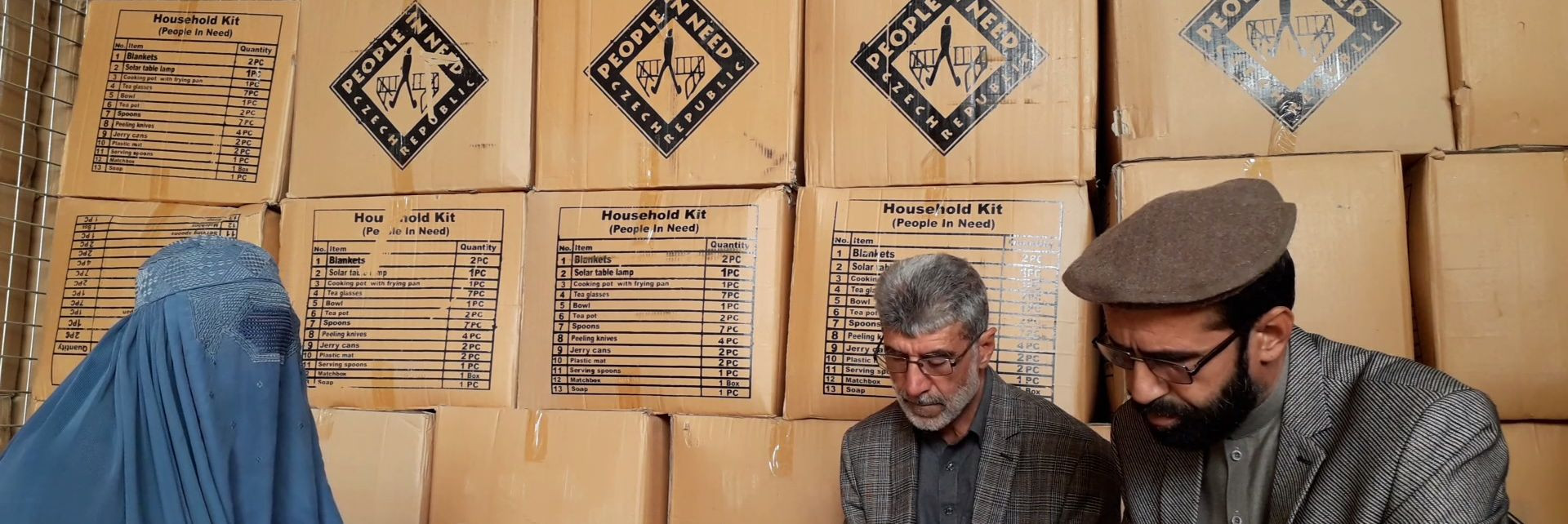Two women, two stories of displacement in Afghanistan
Published: Dec 27, 2019 Reading time: 4 minutes Share: Share an articleFarhah Matiullah came from Afghanistan’s Laghman province, and Lu Luah Ali arrived from Deh Bala in Nangarhar. They didn’t know each other before they arrived, but they nonetheless have a lot in common. Each fled fighting in eastern Afghanistan and is one of over six million Afghans in need of humanitarian aid.

And each was awarded about $150 in cash assistance, part of a program organized by People in Need and funded by USAID’s Office of US Foreign Disaster Assistance.
During interviews at a PIN distribution site in Nangarhar Province, Farhah Matiullah and Lu Luah Ali discussed fleeing violence and what the future may hold.
Why did you leave your village and came here?
Farhah Matiullah: “In my district the war was going on and there was bombing. So, we left and came here. During this war many of my relatives got killed.”
Lu Luah Ali: “The war started in our district; the Armed Opposition Group came and ruined it. I had two sons and one was already injured in his leg, so we planned to leave the district and moved here.”
Do you feel safer in the city?
Farhah Matiullah: “Yes, we knew it was safer here, so we planned to come to this place.”
Lu Luah Ali: “Yes, when we arrived here people told us that there is an organization helping displaced people and then a team came and did a survey.”
What did you manage to bring with you when escaping your home?
Farhah Matiullah: “We didn’t bring anything with us. We only could take some clothes with us, nothing else.”
Lu Luah Ali: “We couldn’t bring anything with us. When we arrived, some people helped us a little bit with some dishes and other stuff.”
What did you need most when you arrived here?
Farhah Matiullah: “We needed food, household tools, and blankets the most.”
Lu Luah Ali: “We didn’t have anything, we lost everything, so we needed any kind of aid and support.”
When you arrived here, what kind of support did you receive?
Farhah Matiullah: “No one helped us when we arrived. We just placed our tent. Then people said that People in Need is supporting and providing aid for IDPs. Later, People in Need’s staff came, did a survey, observed our living conditions, and we told them our problems and listed our names.”
Lu Luah Ali: “No one helped us. The elders of the area told us about People in Need and asked us to refer to the organization as it was providing aid for families. Your colleagues came and saw our house, my injured son’s situation, and observed that we are poor and selected us for support. At the end it was only People in Need that helped us.”
What kind of aid did PIN provide and how did you use it?
Farhah Matiullah: “People in Need provided us with 12,000 Afghani (about $150). From the aid received we bought some flour, rice, food, and some stuff for our children and managed to pay our house rent. We request from the organization to have more aid in future as well.”
Lu Luah Ali: “We received 12,000 Afghani and it helped us a lot. I was able to pay rent and buy some stuff for our house.”
What are your biggest needs now? What do you wish the most?
Farhah Matiullah: “We couldn’t manage to buy blankets, carpets, and other household items because the money was not sufficient to buy all of these things. We request from the organization to have more aid.”
Lu Luah Ali: “My son’s medications are finished and I want to take him to a doctor, but I don’t have enough money because I used the cash assistance for rent. I want this aid to be continued, given that one of my sons lost his leg already and I have to take care of him.”
Do you have a chance to work and earn your own income?
Farhah Matiullah: “Every Friday I go to the houses to do their laundry and help them with their housework. For this I get 15,000 Pakistani rupees (about $100) per month.”
Do you plan to return home someday?
Farhah Matiullah: “Yes, if the situation gets better, for sure I will move back to my own home, because I don’t have anyone here to be with and my children are small. Currently my brother-in-law is with me and wherever he goes, I have to go with him.”
Lu Luah Ali: “Yes, if the situation improves and war is over, for sure I will move back to my own house.”
*Names of people have been changed in the article for security reasons



